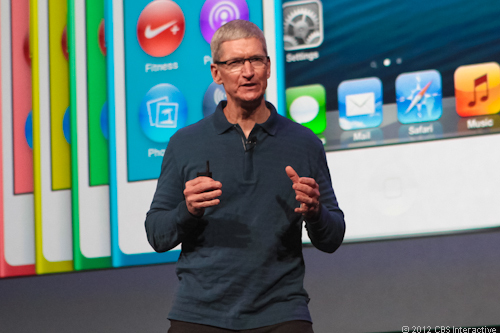Apple Exposes FBI Request to "Build a Backdoor Into iPhone"
"The implications of the government’s demands are chilling."
Apple chief executive Tim Cook has revealed the company is under pressure to develop a version of its operating system that could potentially allow the FBI access to all iPhones and iPads around the world.
In an extraordinary open-letter published on Apple's website, Cook publicly challenged the US government and the FBI, saying what it is asking of the company fundamentally violates the privacy, security, and trust of its customers.
He went as far as calling the demands "chilling," and that if the request was granted, the FBI would "have the power to reach into anyone’s device to capture their data".

Cook said his company has been asked by the FBI to create a "backdoor" hack into the iPhone recovered in the aftermath of the San Bernardino terrorist attack. It is implied in the letter that the FBI only sought to use the backdoor hack once on this single phone, but the exec believes that such technology could be used on all iPhones if provided.
He explained that the FBI's request for a backdoor would allow any iPhone passcode to be input remotely, thus creating an opportunity to brute force through security measures. This, in turn, could grant state officials control of any iPhone hardware, as well as access important private data.
"The FBI wants us to make a new version of the iPhone operating system, circumventing several important security features, and install it on an iPhone recovered during the investigation," he said.
"In the wrong hands, this software--which does not exist today--would have the potential to unlock any iPhone in someone’s physical possession."
He continued: "The FBI may use different words to describe this tool, but make no mistake: Building a version of iOS that bypasses security in this way would undeniably create a backdoor. And while the government may argue that its use would be limited to this case, there is no way to guarantee such control."
iPhones and iPad users represent what is arguably the biggest video game market, thanks to the rise of mobile games. Candy Crush Saga, for example, was reported to have 93 million daily players as of February 2014. Angry Birds 2, meanwhile, passed 10 million downloads in August 2015.
"The government would have us remove security features and add new capabilities to the operating system, allowing a passcode to be input electronically. This would make it easier to unlock an iPhone by 'brute force,' trying thousands or millions of combinations with the speed of a modern computer.
"The implications of the government’s demands are chilling. If the government can use the All Writs Act to make it easier to unlock your iPhone, it would have the power to reach into anyone’s device to capture their data.
"The government could extend this breach of privacy and demand that Apple build surveillance software to intercept your messages, access your health records or financial data, track your location, or even access your phone’s microphone or camera without your knowledge."
Cook equated the technology to a "master key" and said it could be used repeatedly to circumvent privacy protection measures.
The implications of the government’s demands are chilling ... We fear that this demand would undermine the very freedoms and liberty our government is meant to protect
Tim Cook
"Once created, the technique could be used over and over again, on any number of devices. In the physical world, it would be the equivalent of a master key, capable of opening hundreds of millions of locks — from restaurants and banks to stores and homes. No reasonable person would find that acceptable.
"Smartphones, led by iPhone, have become an essential part of our lives. People use them to store an incredible amount of personal information, from our private conversations to our photos, our music, our notes, our calendars and contacts, our financial information and health data, even where we have been and where we are going.
"All that information needs to be protected from hackers and criminals who want to access it, steal it, and use it without our knowledge or permission. Customers expect Apple and other technology companies to do everything in our power to protect their personal information, and at Apple we are deeply committed to safeguarding their data."
The FBI is proposing these measures using the All Writs Act of 1789 to justify an "expansion of its authority," which Cook says was an "unprecedented use" of the legislation.
"Opposing this order is not something we take lightly," Cook said. "We feel we must speak up in the face of what we see as an overreach by the U.S. government.
"We are challenging the FBI’s demands with the deepest respect for American democracy and a love of our country. We believe it would be in the best interest of everyone to step back and consider the implications.
"While we believe the FBI’s intentions are good, it would be wrong for the government to force us to build a backdoor into our products. And ultimately, we fear that this demand would undermine the very freedoms and liberty our government is meant to protect."
Got a news tip or want to contact us directly? Email news@gamespot.com
Join the conversation